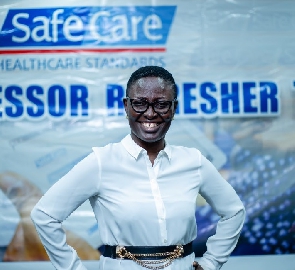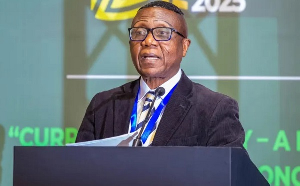Ms. Bonifacia Benefo Agyei, Director of SafeCare, has stated that the SafeCare quality standards and improvement program are a great initiative for Ghana and other African countries in the institutionalization of standard-based quality assurance and improvement systems in healthcare provision.
According to her, expanding coverage alone will not improve disease and healthcare burden in the population unless the question of access to quality is answered.
She strongly makes the point that although access to healthcare services is obviously a challenge that the Government and relevant Stakeholders must relentlessly work to address, low quality of care in healthcare facilities seriously compromises the efforts put into ensuring access to healthcare services.
“If the patient or the community's trust in healthcare quality is low, it leads to low patronage.
"Our nation’s healthcare system will be no close to the attainment of Universal Health Coverage unless we turn our attention to ensuring that health facilities implement quality improvement programs. In doing so, objective measurement is key; SafeCare offers standards and methodology for objective assessment and rating and support for stepwise improvement," Ms. Benefo Agyei explained.
Ms. Bonifacia Benefo Agyei is, however, pleased that since the introduction of the SafeCare program, quality improvement in healthcare is gradually receiving attention among healthcare providers and health administrators in Ghana.
Speaking on the SafeCare Standards for healthcare quality improvement program, she said, the SafeCare Healthcare Quality Standards were developed through a joint initiative of PharmAccess Foundation and two healthcare accreditation think tanks, the Joint International (JCI) and the Council for Health Service Accreditation of Southern Africa (COHSASA).
She noted that the SafeCare program empowers healthcare providers to progress by helping them measure, monitor, improve, and benchmark their services using innovative solutions and internationally accredited quality standards.
“SafeCare has a specific goal of supporting healthcare providers in emerging markets or LMIC toward achieving global standards of quality and patient safety, most importantly, without compromise,” Ms. Bonifacia Benefo Agyei observed.
The SafeCare quality Standards are divided into 13 different categories (Service Element), covering the full range of medical/ clinical to non-medical (management and administrative) aspects of care and ranging from small health posts to large (primary & secondary) hospitals.
The Standards are accredited by the International Society for Quality in Health Care External Evaluation Association (ISQuaEEA). The thirteen service elements comprise one hundred and seventy sub-categorizations (standards) with each standard having four criteria to measure the quality performance of healthcare facilities.
Support for quality healthcare improvement in Africa
The SafeCare Director told journalists that the overall SafeCare program is designed to help develop and improve the capacities of healthcare professionals through the assessors’ and facilitators’ training, onsite facility training, the assessment process, and progressive digitally supported quality facilitation.
She indicated that the program affords selected healthcare professionals to be trained and mentored to be internationally certified assessors and improvement facilitators who use the SafeCare standards, tools, and operational modules to support healthcare facilities toward improvement.
“For more than ten years, SafeCare has supported governments, healthcare provider networks, organizations, and individual healthcare facilities to institutionalize quality improvement in healthcare systems in countries such as Kenya, Tanzania, Nigeria, and Ghana,” Ms. Benefo Agyei said.
She further emphasized that depending on a facility's performance against the SafeCare standards, it is awarded a certificate of improvement, ranging from level 1 (very modest quality) to level 5 (high quality).
The SafeCare certificate of improvement includes the facility's name score and the level attained, enabling the facility to increase patient and partner trust by publicly recognizing its current status and showing its progress as it advances in its improvement journey.
As the facility improves its performance against the SafeCare standards, it progresses to the next certificate of improvement, providing a transparent, positive, and motivational rating system that recognizes each stage of the improvement journey.
“The progress made by the facility on the improvement journey directly impacts the professionalism of the staff, the quality of care given to patients, and all other essential outcome indicators,” she added.
SafeCare’s partnerships and impact on healthcare quality improvement:
Ms. Bonifacia Benefo Agyei engaging the media revealed that over 3000 public and private health facilities in 6 countries in Africa have been assessed using the SafeCare standards, 80% of the facilities improve in quality and 914 healthcare professionals of various specialities have been trained as certified assessors and quality improvement facilitators.
“In Tanzanian Ministry of Health and Social Welfare (MOHSW) has adopted the SafeCare standards as the basis for stepwise certification and development of the regional referral hospitals assessment tool.” She added. In Nigeria, SafeCare is cooperating with the Ministry of Health of State to implement the SafeCare methodology in the public sector,” Ms. Bonifacia Benefo Agyei explained further.
In Ghana, she stated, SafeCare supported the development of the NHIA credentialing tools, and HeFRA's inspection tools for licensing, adding, the SafeCare Ghana office works with over 600 healthcare facilities and has performed 1117 SafeCare assessments. There are also 45 healthcare professionals of varying grades and expertise who have also been trained and certified as assessors and facilitators.
SafeCare Ghana partners with the Christian Health Association of Ghana, Marie Stopes International Ghana, and Africa Health Holdings (Manager of the Rabito Clinic brand in Ghana) in using the standards and methodology to rate, improve, and benchmark the healthcare facilities with their networks.
Additionally, there are individual private organizations and health facilities chains and networks including Sanford World Clinics, and New Crystal Health Services that use the SafeCare approach as their quality improvement program.
Not long ago, the Health Facilities Regulatory Agency announced its recognition of the SafeCare quality standards and improvement methodology for certification and quality accreditation.
When asked what she hopes the SafeCare program achieves in Ghana the Director of SafeCare responded:
“I am looking forward to all healthcare system regulators, decision and policymakers, managers, and providers embracing the SafeCare program as an opportunity for changing how healthcare services are provided in Ghana.
"I am also looking forward to using quality standards such SafeCare to empower patients and healthcare consumers to make informed choices about where they can obtain quality healthcare.”
General News of Monday, 7 November 2022
Source: www.ghanaweb.com
SafeCare provides quality improvement systems for better healthcare delivery – Director
Entertainment












